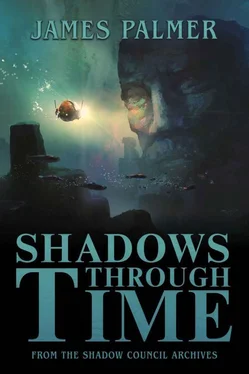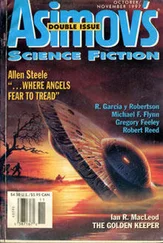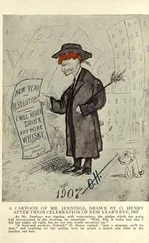“This version of the Nautilus is more than 140 meters long, more than twice the length of its predecessor,” said Captain Nemo. “It is a long cylinder with conical ends, like a cigar, which helps it slide effortlessly through the water. Its top speed is fifty knots.”
“How does it dive and ascend?” asked Herbert.
“Come, I will show you.”
Nemo led them down a short flight of stairs into a more utilitarian part of the vessel, everything a dull gray. A low roar drummed in their ears, the sound of the ship’s engines. Nemo nodded to a passing attendant as the little man ducked out of sight through a hatchway, then twisted open another door set near it. He ushered them through.
“Wait,” said Challenger. “Where’s Miss Marsh?”
“I’d wager she’s already had the tour,” said Burton, urging the bigger man through before him.
Long rows of pipes ran along the walls, some of them feeding into enormous tanks that crowded the corridor walls from floor to ceiling.
“Ballast tanks,” said Herbert.
“Exactly,” Nemo replied. “We can control the ship’s buoyancy and depth with these tanks. To dive, the pumps suck in water. To surface, the pumps expel the water with great force. But enough of that. You did not come here to marvel at my vessel’s engineering.”
Captain Nemo led them from the room as Herbert and Challenger barraged him with questions about the Nautilus . Burton did not care one wit about the vessel, as fantastic as it was. He cared no more about the Nautilus than a tramp steamer bound for Zanzibar. His interest was in the man who built it. What kind of a man would shun not just a particular king and country, but the world entire, to live in the ocean? What must have happened to that man? What could such a man possibly want with him? What was such a man capable of?
Burton considered the true purpose of the Nautilus . A perfect weapon of war. A fleet of such submarine vessels could attack and destroy ships of an enemy nation with impunity.
Yet the Nautilus did not belong to any government. It was not part of a fleet. And it was built for comfort, not war. That was something, at least. Burton hoped he would find out his purpose for being there soon.
They returned to the more familiar section of the ship, and Nemo ushered them into a large, wood-paneled room. The floor was covered in Persian rugs, the walls adorned with framed displays of preserved sea life, and there were more objects on pedestals displayed throughout the room. This piqued Challenger’s interest. He stared into case after case, amazed.
“You have specimens here that are unknown to science,” the zoologist declared.
“I am aware of that, Professor,” said Nemo.
“But they must be in a museum,” said Challenger. “They must be shared with the world.”
“They are in a museum,” Challenger corrected. “As for the rest of the world, if they want to discover them, they had best get past their petty bickering and get on with it.”
Before the debate grew more heated, Miss Marsh entered the room, smiling. “I trust you all enjoyed your tour.”
Nemo grinned, taking her hands. “They most certainly did. Now to the matter at hand; why you are all here.”
Burton, Challenger, and Herbert formed a semi-circle in front of Nemo as he moved to a wide flat desk and opened up the carpet bag Burton remembered from his first meeting with Miss Marsh. He reached in and pulled out a stack of newspapers, his eyes glancing over the headlines.
“The first iteration of this vessel,” said Nemo, “held a library containing newspapers and magazines from all over the world, dated from when I first shunned the surface to live aboard the Nautilus . I read through these for years, feeling no need to have any awareness of current news. Recent events have convinced me I need to stay more up to date. Miss Marsh is kind enough to go ashore and procure these for me from time to time.”
He picked up an issue of The London Gazette . “You, no doubt, are aware of the recent bouts of madness occurring among spiritualist mediums in your country.”
“Yes,” said Burton. “Is that why we are here?”
“That is part of it,” said Nemo. “This occurrence of madness is just the symptom. I seek the cause.”
“Miss Marsh told us of the recent undersea events occurring at a set of remote coordinates,” Challenger said. “Now, what is all this about?”
Nemo placed the newspaper down on the stack with the others. “You have been recruited for a great and secret purpose,” he said. “Certain cataclysmic events are taking place across the world, which require men and women of a certain fortitude. From time to time, these exceptional men and women assemble, in secret, to battle the darkness that threatens us all. We call ourselves the Shadow Council.”
“And what darkness is that?” asked Professor Challenger.
“You already know of the madness in London, among the spiritualists,” said Nemo, hands clasped behind his back. “This, so far, is its northernmost point. For now. It goes much farther, down through the coast of France, through the Greek Isles, the southernmost island of Japan, and into the South Seas, though it is much worse down there, near the epicenter.”
“Epicenter?” said Challenger. “You speak as if it is the locus of some disease.”
“Perhaps it is,” said Nemo. “Though a disease of the mind rather than the body. It started with several remote sea quakes too far away from any inhabited land to be felt. But I and my crew felt them.”
Nemo came around the desk and went to a long table, where a large map had already been unrolled, the four corners held down by large conch shells. “I am convinced the quakes, and the resultant madness, originated here.” He pointed at a spot in the middle of the ocean just above the Antarctic Circle.
“Those are the same coordinates Miss Marsh showed us,” Burton observed.
“And there’s nothing there,” added Challenger. “As I explained to Miss Marsh.”
“Above the waves, that is true,” said Nemo. “What we seek is underwater. I believe a large landmass is rising. I also believe it has been above the waves before, and its return is causing upheavals not just in the physical world, but on the psychic plane as well. It manifests itself as a general sense of dread or unease, all the way to full-blown madness. I know you have seen evidence of this—perhaps you have even experienced it yourself, or witnessed it in others.”
Burton thought of his late friend John Hanning Speke and his lunatic ravings before the malaria took hold of them both. A chill ran up his spine.
“We believe this madness will spread,” said Miss Marsh. “First to those unusually sensitive to such things, like mediums, then to the general populace, until the entire world is affected.”
“How can you possibly know this?” asked Burton. “And how can you think that these two remarkable events are related?”
“We have found entire islands where the inhabitants were slain,” said Nemo. “Like some mass suicide. As we moved toward the continents, this strange behavior was lessened but still present. When questioned, the affected people will say they have a vague sense of doom, like the end is coming, though even they cannot say how or why they feel this way. Miss Marsh has collected newspapers from every port of call between here and the South Sea Islands. They all report the same occurrences. People nervous without cause. Unexplained murders. Suicides.”
Burton thought once more of Speke, who died less than two days ago in a hunting accident. Had it really been an accident? Or had the old fool sensed some dread approaching from far away?
Читать дальше











